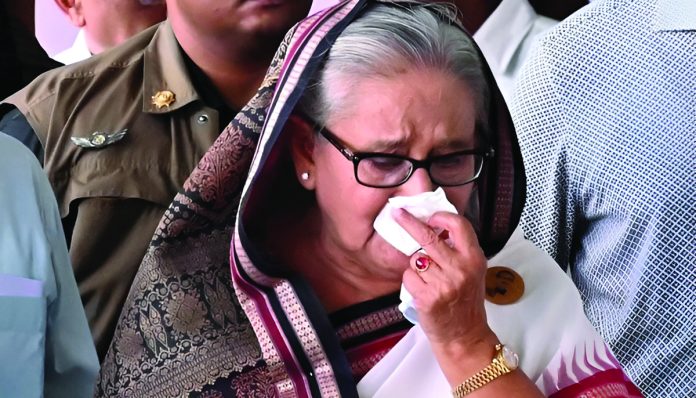Dr Uzma Shujaat
Politics is full of surprises; it’s always on a moving trajectory of challenges, hopes, relationship and changing policies. This very time for emerging Pakistan-Bangladesh relations after an unprecedent ouster of Sheikh Hasina Wazed a symbol of tyranny and revenge since the swearing in of Dr. Yunus as the chief of interim government in August 2024, the relationship between Pakistan and Bangladesh is moving towards cordial relations.
The history of the two, if we see into retrospect touched new lows in Sheikh Hasina government long 15 years rule. Pakistan never enjoyed trustworthy relations with Bangladesh. The one major reason was her close proximity to India that always swerved the relations most.
The Geopolitics is full of unpredictable manoeuvring now Bangladesh is passing through “India out” campaign, and it is a huge geopolitical set back for India, loosing one of trusted partner in South Asia is just indigestible.
According to Tim Marshall state are prisoners of the geography, they cannot change their neighbour and place. In the context, Michael Kugelman, director for the Wilson Center for South Asia, India has suffered a major geopolitical blow in Bangladesh. It’s dealing with something that close to a nightmare scenario, as for India Sheikh Hasina was the only viable option while considering any alternative unfavourable to is regional interests. India will try its level best not to compromise on the shared border, water resource collaboration and strong trade relations. India by all means will continue to manoeuvre a strategically important role for Dhaka
Geopolitics concerned basically with the study of the state in the context of global phenomena in an attempt to understand both the basics of state power, and the nature of state interaction with each other. Saul B. Cohen a prominent geostrategic considered the entire world as being divided into geostrategic regions. He suggested the dynamic balance that characterized relations among states.
According to Cohen, the world is organized politically in rational, not random fashion. He rejected the notion that sphere of influence are obsolete. He maintained that sphere of influence are essential to the preservation of national and regional expression.
If we can analyse the politics in South Asia, we can better understand the geostrategic suggested by Cohen. His GSR geostrategic regions are essentially the sphere of influence of USA, Europe, former Soviet Union now Russia and China. He classified South Asia as an independent area and identified Middle East and South Asia as shatterbelt.
The term shatterbelt has been applied to a region of chronic instability in which states appear, disappear and reappear with frequently changing names and boundaries. There is not a strategic unity of space but rather there are separate arenas in a fundamentally divided world. This illustration of Cohen have closely identified the situation in the South Asian region.
The emerging future trajectory of Pakistan-Bangladesh relations emphasises on the need to strengthen the bilateral ties. It is an opportunity to reset the compass at all levels. Since the inception of Dr. Yunus, as Chief Adviser of the country, they are demonstrating a shift in its foreign policy, which is suggestive of a fact that both the countries can re-start with the new beginning, re-imagination of the new pathways and shedding the excess baggage.
The new dimension for now, Bangladesh appears to be moving away from is reliance on New Delhi, as for a larger part of history of relationship between the two have remained a function of the larger regional geopolitical contestations. The Chief Advisor of the interim government has a vocal critic of the Bangla-India centric era under Sheikh Hasina. The anti-Indian sentiments in Dhaka are illustrative of the fact that Pakistan can use this space for foreign policy gain, the opportunity we can exploit for the favour of both the countries.
In this context, efficient and productive framework for political and economic collaboration is necessary, joint economic forum serve, bilateral trade on preferential basis can be an appropriate option. Dawn News reported that Dr. Younus stated that increasing trade and investment between the two countries must be a top priority to move forward.
He is quite eager to improve relations with Pakistan, which have been less than satisfactory over the past decade. The demography of Bangladesh with 180 million represents a significant consumer market that Pakistan has the potential to tap and we can capitalize on it. If we see around despite growing regional cooperation globally, South Asia still face challenges which require collective efforts to overcome them. The data between two-way trades amounted to $718 million during the fiscal year 2023-24, according to Lahore Chamber of Commerce and Industry (LCCI) on January 11, 2025. One positive move from the interim government is it has simplified the visa process for Pakistan to further strengthening and improving the trade and economic ties.
Another dimension of cooperation between South Asian countries is revitalizing the South Asian Association for Regional Cooperation (SAARC) to enhance regional trade and cooperation. The lesson to learn from the past is division shapes politics at every level, local, national and international. It is essential to be aware of what has divided us, and what continues to do so, in order to understand what is going on in the world today.
The author is the Acting Director of the Area Study Centre for Europe, University of Karachi.







